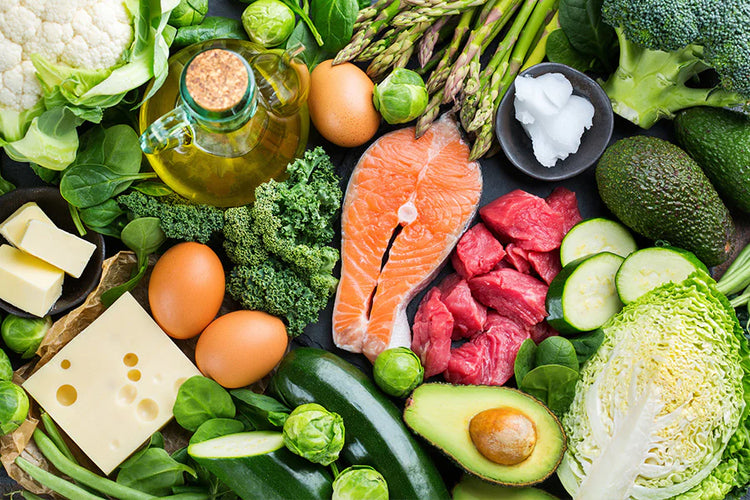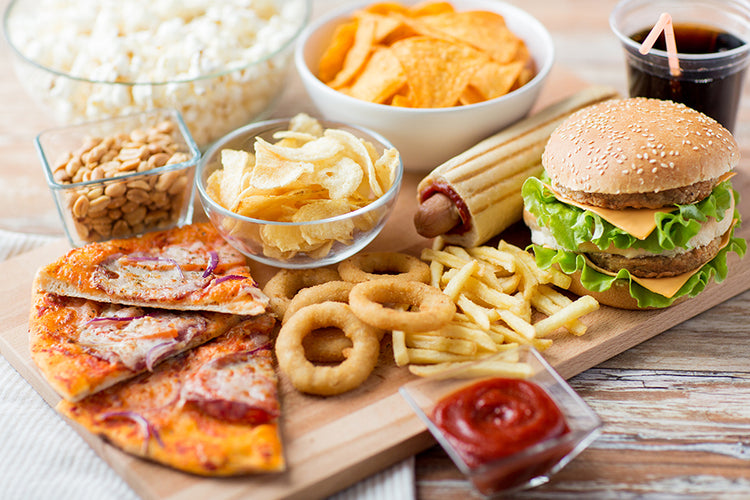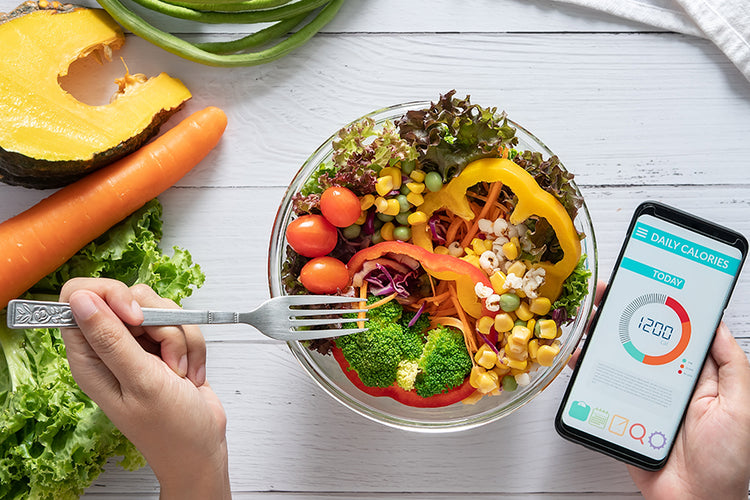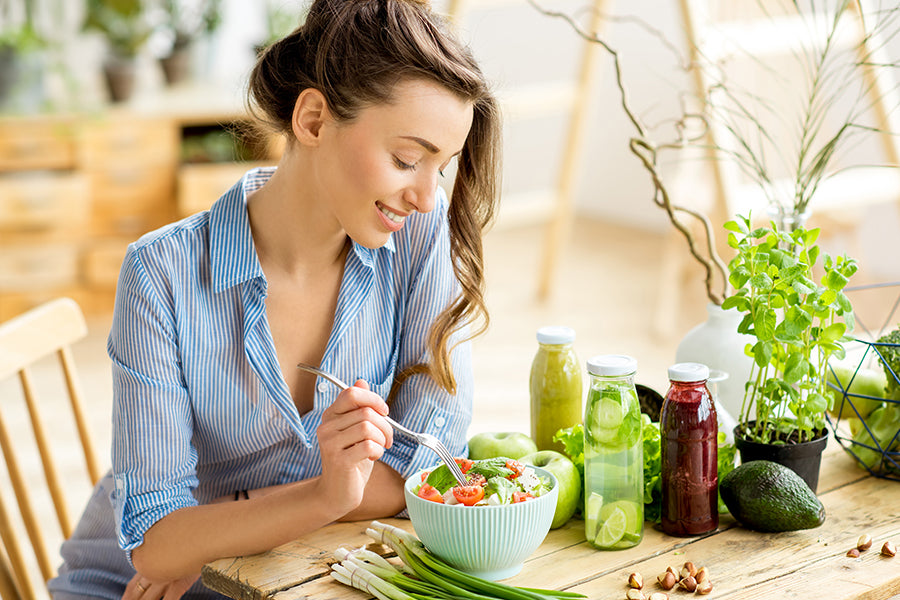Let's face it, shedding those extra pounds can be challenging. Your metabolism may be as slow as a sleepy snail, or your appetite may be as insatiable as a bottomless pit. Whatever the reason, losing weight can feel like an uphill battle.
But fear not because, with determination and clever tips, you can conquer the scale and emerge victorious. So buckle up & get ready to say goodbye to those pesky pounds!
Sticking to a diet and exercise plan can be a real struggle, but don't give up! Although losing weight may seem impossible, studies suggest you can achieve your dream body by overcoming these challenges with determination and perseverance!
It's time to say goodbye to your past failures and embrace a new and better version of yourself. So, get ready to work hard, stay focused, and reach your weight loss goals! You might have heard that our bodies are the products of our diet and lifestyle habits.
If we're eating more than we need and not getting enough exercise, you can bet the scale will start to tip. To shed those pesky pounds, we must go against the grain and create a calorie deficit - that means burning more than we take in.
While it may be challenging, it is possible to break these habits and adopt healthier choices that will lead to weight loss and maintenance. Let's get started on this journey toward a healthier you!
Since there's no one-size-fits-all approach to dropping those extra pounds, some of you might thrive on a controlled diet and exercise routine, while others need a more flexible plan. Finding a method that works for you and can stick to it is vital. We won't sugarcoat it - making healthy changes isn't always a cakewalk, but trust us; it's worth it in the end. Let's get cracking!
The Role of Diet in Losing Weight

It is essential to consider the power of diet when it comes to weight loss. A good diet is a crucial component of any weight loss program. And let's be honest, we can't expect to shed pounds and keep them off without doing some diet tweaking.
So, put down that donut and start making some changes. Your waistline will thank you! It would help if you started with your plate to drop a few pounds. It's time to make some dietary changes. But don't worry; you don't have to feel hungry to reach your goals!
The first step to start your weight loss journey is to reduce calories. You can do this by opting for smaller, more frequent daily meals. Say goodbye to those high-calorie sweets, fatty meats, and processed snacks. Select alternative, healthier options that will help you stay on track.
In the words of Michelle Obama, said back in an event in 2011 in White House;
"When you embark on your journey toward health, it's important to remember one thing: It's about progress not perfection." ~Michelle Obama
Remember, weight loss isn't about depriving yourself of the foods you love. It's about making healthy choices to fuel your body and lead to a happier, healthier you. Start small and stay committed - you've got this!
Just remember this simple equation: a calorie deficit = weight loss! Why not cut down on calories or move more? Either way, you're sure to see results. Let's make those pounds disappear!
If you want to feel full while eating less? Look no further than fiber- the unsung hero of your digestive system. And the best part? You'll find it in tasty food like fruits, veggies, and whole grains. Amp up your fiber intake and regulate your digestion all in one simple dietary change.
Let me unveil another amazing thing; maintaining hydration or drinking water is the ultimate elixir for flushing toxins, taming hunger, and keeping things regular. Aim to chug eight glasses a day for optimal results. You may also try DMoose EAA hydration supplements that contain a unique blend of amino acids to keep your body hydrated especially during intense workouts. Your body will thank you!
Let's get real here; those trendy diets are temporary fixes that only lead to no weight loss and endless frustration. Don't let them fool you! To lose weight and keep it off, you have to make some moves that will stick. That means saying sayonara to the cupcakes for good and hello to a fitter you - for life. So what are you waiting for? It's time to ditch the immediate fixes and start making permanent changes!
How Many Calories Should You Consume to Lose Weight?

According to a study, the number of calories you need to eat varies depending on your age, gender, activity level, and your current weight. Trust us; it's easier than it sounds. Calculating your Basal Metabolic Rate (BMR) determines precisely how many calories your body needs to carry out essential functions like breathing and digesting food.
Armed with this info, you can chow down on the right amount of grub to help you lose weight-sensibly and safely. So, give your diet an intelligent boost by finding your BMR today!
Let's break it down! If you're a 30-year-old, 5'5" woman weighing 150 pounds, your BMR (aka how many calories you burn at rest) is roughly 1,471 calories daily. But you want to shed some weight. Therefore, you consume a 500-calorie deficit diet to help achieve the results you desire.
That means you'll need to limit yourself to 971 calories per day. Remember, what you eat matters! A deficit of 500 per day is usually the sweet spot for safe and effective weight loss, however everyone's dietary needs differ and it's important to consult your health care team regarding how many calories your body needs a day.
Related Article: Basal Metabolic Rate: Better Than Math When Calculating Calories Needed to Lose Weight
Recommended Foods That Facilitate Weight Loss

Losing weight can be a struggle, but fear not, friend! While everyone has to find their magic method, some foods can help you reach your goals. Here are some general recommendations to start your weight loss journey. Let's do this!
Non-Starchy Vegetables
Non-starchy vegetables are essential for weight loss because they are low in calories and high in fiber. Fiber helps keep you full longer, making you less likely to overeat. Non-starchy vegetables are also rich in vitamins, minerals, and antioxidants, essential for good health.
Some great non-starchy vegetables include leafy greens, cruciferous vegetables like broccoli and cauliflower, and tomatoes. Be sure to include various varieties in your diet for the most benefit. And remember, every little bit counts when it comes to weight loss!
Fruits
Fruits are a crucial part of any diet, including a weight-loss diet. Fruits are packed with nutrients and fiber that help keep you healthy and whole. Plus, they're low in calories and fat. Eating fruit as part of a healthy diet can also help you lose weight.
Eat at least a couple of pieces of fruit daily to lose weight. Choose a variety of fruits to get the most benefit and enjoy their different flavors. And be sure to include high-fiber fruits like pears, apples, and berries in your diet.
Starchy Vegetables
Vegetables are an essential part of any weight loss diet. Since they have more fiber and fewer calories, which can help keep you feeling full. You may choose complex carbohydrates to provide the energy your body needs, which include starchy vegetables such as potatoes and sweet potatoes your body needs for energy.
When trying to lose weight, it is essential to eat various healthy foods to avoid getting bored with your diet. Starchy vegetables can help add variety and flavor to your meals. Try roasting or mashed potatoes instead of fries or baked sweet potatoes instead of candy.
Poultry & Meat
Poultry and meat are excellent protein sources essential for losing weight. Protein helps keep you full longer, making you less likely to snack between meals. It also helps build and maintain lean muscle mass, which helps boost your metabolism and burn more calories.
You can opt for poultry as a great source of iron, vital for carrying oxygen to your cells and preventing fatigue. Including poultry and meat can help you reach your weight loss goals.
Seafood
Seafood is a fantastic source of protein, and it can be very helpful in losing weight. You can consume seafood as it is also low in calories and fat content, so it is an excellent option to lose weight. Additionally, seafood is high in omega-3 fatty acids, which are beneficial for the heart and health in general.
Not only this, but Omega-3 fatty acids can help reduce inflammation throughout the body and can also help lower your cholesterol levels. For these reasons, eating seafood can benefit those trying to lose weight.
Fats
Healthy fats support numerous bodily functions, including hormone production, brain function, and more.Regarding weight loss, healthy fats can help you lose weight. That's because they help keep you feeling full and satisfied after eating.
When you feel satiated, you're less likely to reach for unhealthy snacks or overeat at your next meal.Plus, they can help reduce inflammation throughout the body linked to obesity.Healthy fats include avocados, olive oil, nuts, and seeds. Incorporate these into your diet to support your weight loss goals.
Dairy Products
Dairy products are often thought unhealthy, but they can be beneficial when losing weight. Dairy products contain various nutrients that can help promote weight loss, including protein, calcium, and vitamin D. Calcium is also essential for weight loss because it helps regulate the release of fat from your cells.
Vitamin D is essential for weight loss because it helps your body absorb calcium better. Various dairy products can be helpful for weight loss, including milk, yogurt, cheese, and ice cream. If you are trying to lose weight, choose dairy products low in fat and calories.
Legumes & Plant-Based Protein
Incorporating legumes and plant-based proteins into your diet has many benefits, especially if you are trying to lose weight. They're a great source of fiber that can help keep you full and satisfied after meals; legumes and plant-based proteins make a perfect choice for those who are watching their weight.
Legumes and plant-based proteins are enriched with nutrients like antioxidants, minerals, and vitamins are essential for good health. Another reason legumes and plant-based proteins are great for weight loss is that they are very filling. It means we're less likely to overeat or snack on unhealthy foods between meals.
Whole Grains
Whole grains are an essential part of any weight loss plan. They are packed with nutrients that can help boost metabolism, regulate blood sugar levels, and provide lasting energy. Moreover, whole grains are also a good source of fiber, keeping you feeling full longer.
There are many types of whole grains, so you can easily find ones that fit your taste and lifestyle. Some popular options include oats, quinoa, brown rice, and barley. By incorporating whole grains into your diet, you can make healthy eating more manageable and enjoyable.
Related Article: 11 Evidence-Based Benefits of Omega-3 Fish Oil
Foods to Avoid While Losing Weight

Losing weight can be a tough nut to crack. But did you know that the solution could lie in avoiding certain foods? Yes, you heard it right! Choosing the right foods can make or break your weight loss goals- so choose wisely!
Here are some of the most notorious culprits that you should steer clear of if you want to see some actual results:
- Refined Carbs: Foods like white bread, pasta, and rice are made with refined carbs, which can spike your blood sugar levels, resulting in cravings and increased hunger.
- Trans Fats: The majority of fried and processed foods are rich in Trans fats; therefore, such foods can manifold your risk of heart disease and reduce lifespan.
- Sugar-Sweetened Beverages: Sodas, sports drinks, and other sugary beverages are very high in calories and can play their part in your weight gain.
- Alcohol: Drinking alcohol can lead to weight gain and health problems like liver damage.
- Saturated Fats: Dairy and animal products are rich in saturated fats and are found in animal products, and can increase your cholesterol levels.
- Processed Meats: Processed meats like bacon, sausage, and deli meat are high in saturated fats and sodium, contributing to weight gain.
- High-Sodium Foods: Foods high in sodium can cause you to retain water and may lead to weight gain.
- Unhealthy Snacks: Chips, candy, and other unhealthy snacks can contribute to weight gain.
- Desserts: Desserts are often high in sugar, calories, and fat, making them not a good choice for those trying to lose weight.
- Other Processed Foods: Many other processed foods, such as frozen dinners, are high in calories and may contribute to weight gain.
You should avoid processed and fried foods, sugary beverages, alcohol, and high-sodium foods while trying to lose weight. Eating a healthy diet of fresh fruits, vegetables, and whole grains is the best way to lose weight and keep it off, as they also contain essential vitamins and minerals.
Related Article: Vitamins and Minerals: What Are They & Why Should I Care?
1500 Calories Meal Plan to Lose Weight

Are you tired of counting calories and never seeing results? We've covered you with an entire 1500-calorie meal plan daily, three meals, and two snacks. Yes, you read that right - you can still indulge in midday snacking without feeling guilty.
Don't let restrictive diets bring you down - join us on this tasty weight loss journey from day one to the end. Let's explore and enjoy!
Day 1 - Total Calories: 1500
- Breakfast: Greek yogurt with berries and nuts (1 cup non-fat Greek yogurt, 1/2 cup mixed berries, 20g almonds) - 220 calories (Protein: 18g, Carbs: 23g, Fat: 9g)
- Lunch: Chicken salad (100g grilled chicken breast, 2 cups mixed greens, 1/2 cup cherry tomatoes, 1 tbsp olive oil) - 300 calories (Protein: 32g, Carbs: 8g, Fat: 15g)
- Dinner: Grilled salmon with quinoa and broccoli (100g salmon, 1/2 cup cooked quinoa, 1 cup steamed broccoli) - 385 calories (Protein: 35g, Carbs: 30g, Fat: 14g)
- Snacks: Baby carrots with hummus (10 baby carrots, 2 tbsp hummus), 1 medium apple - 195 calories (Protein: 4g, Carbs: 40g, Fat: 4g)
- Macros: Protein: 89g, Carbs: 101g, Fat: 42g
Day 2 - Total Calories: 1500
- Breakfast: Scrambled eggs with spinach and whole grain toast (2 eggs, 1 cup spinach, 1 slice whole grain toast) - 270 calories (Protein: 19g, Carbs: 20g, Fat: 14g)
- Lunch: Tuna salad (1 can light tuna in water, 2 cups mixed greens, 1 tbsp olive oil) - 310 calories (Protein: 31g, Carbs: 4g, Fat: 18g)
- Dinner: Baked chicken with sweet potato and green beans (100g chicken breast, 1 medium sweet potato, 1 cup green beans) - 385 calories (Protein: 35g, Carbs: 35g, Fat: 10g)
- Snacks: Greek yogurt (1 cup, non-fat), 1 medium banana - 235 calories (Protein: 14g, Carbs: 45g, Fat: 0g)
- Macros: Protein: 99g, Carbs: 104g, Fat: 42g
Day 3 - Total Calories: 1500
- Breakfast: Oatmeal with berries and nuts (1/2 cup cooked oats, 1/2 cup mixed berries, 20g walnuts) - 295 calories (Protein: 9g, Carbs: 40g, Fat: 14g)
- Lunch: Quinoa and chickpea salad (1/2 cup cooked quinoa, 1/2 cup chickpeas, 2 cups mixed greens, 1 tbsp olive oil) - 335 calories (Protein: 12g, Carbs: 48g, Fat: 12g)
- Dinner: Grilled shrimp with brown rice and asparagus (100g shrimp, 1/2 cup cooked brown rice, 1 cup asparagus) - 370 calories (Protein: 29g, Carbs: 41g, Fat: 10g)
- Snacks: Baby carrots with hummus (10 baby carrots, 2 tbsp hummus), 1 medium pear - 200 calories (Protein: 5g, Carbs: 40g, Fat: 5g)
- Macros: Protein: 55g, Carbs: 169g, Fat: 41g
Day 4 - Total Calories: 1500
- Breakfast: Greek yogurt with granola and honey (1 cup non-fat Greek yogurt, 1/4 cup granola, 1 tbsp honey) - 240 calories (Protein: 20g, Carbs: 40g, Fat: 3g)
- Lunch: Turkey wrap (1 whole grain tortilla, 100g turkey breast, lettuce, tomato, 1 tbsp mayo) - 320 calories (Protein: 25g, Carbs: 36g, Fat: 10g)
- Dinner: Baked cod with quinoa and Brussels sprouts (100g cod, 1/2 cup cooked quinoa, 1 cup Brussels sprouts) - 400 calories (Protein: 35g, Carbs: 45g, Fat: 10g)
- Snacks: Almonds (30g), 1 medium orange - 240 calories (Protein: 8g, Carbs: 25g, Fat: 15g)
- Macros: Protein: 88g, Carbs: 146g, Fat: 38g
Day 5 - Total Calories: 1500
- Breakfast: Scrambled tofu with vegetables and whole grain toast (1/2 cup tofu, 1 cup mixed vegetables, 1 slice whole grain toast) - 260 calories (Protein: 18g, Carbs: 30g, Fat: 10g)
- Lunch: Chicken Caesar salad (2 cups romaine lettuce, 100g grilled chicken, 2 tbsp Caesar dressing, 1 tbsp parmesan cheese) - 350 calories (Protein: 30g, Carbs: 10g, Fat: 20g)
- Dinner: Grilled steak with sweet potato and green beans (100g lean steak, 1 medium sweet potato, 1 cup green beans) - 450 calories (Protein: 35g, Carbs: 45g, Fat: 15g)
- Snacks: Greek yogurt (1 cup, non-fat), 1 medium apple - 240 calories (Protein: 14g, Carbs: 45g, Fat: 0g)
- Macros: Protein: 97g, Carbs: 130g, Fat: 45g
Day 6 - Total Calories: 1500
- Breakfast: Oatmeal with banana and peanut butter (1/2 cup cooked oats, 1 medium banana, 1 tbsp peanut butter) - 325 calories (Protein: 11g, Carbs: 52g, Fat: 11g)
- Lunch: Shrimp salad (100g shrimp, 2 cups mixed greens, 1/2 cup cherry tomatoes, 1 tbsp olive oil) - 315 calories (Protein: 24g, Carbs: 12g, Fat: 20g)
- Dinner: Baked salmon with brown rice and broccoli (100g salmon, 1/2 cup cooked brown rice, 1 cup broccoli) - 405 calories (Protein: 33g, Carbs: 34g, Fat: 17g)
- Snacks: Baby carrots with hummus (10 baby carrots, 2 tbsp hummus), 1 medium pear - 225 calories (Protein: 5g, Carbs: 47g, Fat: 5g)
- Macros: Protein: 73g, Carbs: 145g, Fat: 53g
Day 7 - Total Calories: 1500
- Breakfast: Greek yogurt with berries and nuts (1 cup non-fat Greek yogurt, 1/2 cup mixed berries, 20g almonds) - 220 calories (Protein: 18g, Carbs: 23g, Fat: 9g)
- Lunch: Veggie stir-fry with tofu (1 cup mixed vegetables, 100g tofu, 1 tbsp olive oil) - 320 calories (Protein: 19g, Carbs: 20g, Fat: 21g)
- Dinner: Grilled chicken with quinoa and Brussels sprouts (100g chicken breast, 1/2 cup cooked quinoa, 1 cup Brussels sprouts) - 385 calories (Protein: 35g, Carbs: 35g, Fat: 13g)
- Snacks: Baby carrots with hummus (10 baby carrots, 2 tbsp hummus), 1 medium apple - 195 calories (Protein: 4g, Carbs: 40g, Fat: 4g)
- Macros: Protein: 76g, Carbs: 118g, Fat: 47g
Final Words
Are you tired of carrying those extra pounds around with you everywhere? Say goodbye to them by jumping on board with a 1500-calorie meal plan! This plan consists of three meals and two snacks totaling 1500 calories daily.
But don't just cut out all calories blindly. Calculate your introductory metabolic rate (BMR) to understand precisely how many calories you require daily. Every meal and snack should contain a balanced mixture of complex carbohydrates, healthy fats, and proteins to satisfy you throughout the day.
The key to this plan's success is incorporating nutrient-rich foods like dark green leafy vegetables, non-starchy vegetables, fruits, whole grains, low-fat dairy products, lean meat, seafood, plant-based proteins, and healthy fats into your diet. So, what are you waiting for? Let's get started on shedding those extra pounds!
Reading List
Article Sources
- Teixeira, Pedro J., et al. "Motivation, Self-Determination, and Long-Term Weight Control." The International Journal of Behavioral Nutrition and Physical Activity, vol. 9, Mar. 2012, p. 22. PubMed Central, https://doi.org/10.1186/1479-5868-9-22.
- SHAPSES, SUE A., et al. "Effect of Calcium Supplementation on Weight and Fat Loss in Women." The Journal of Clinical Endocrinology and Metabolism, vol. 89, no. 2, Feb. 2004, pp. 632-37. PubMed Central, https://doi.org/10.1210/jc.2002-021136.
- Khosravi, Zahra Sadat, et al. "Effect of Vitamin D Supplementation on Weight Loss, Glycemic Indices, and Lipid Profile in Obese and Overweight Women: A Clinical Trial Study." International Journal of Preventive Medicine, vol. 9, July 2018, p. 63. PubMed Central, https://doi.org/10.4103/ijpvm.IJPVM_329_15.








